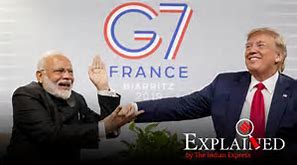By Prasad Nallapati, Aug 23, 2019
President Trump will be raising the Jammu and Kashmir issue when he meets Prime Minister Modi at the G 7 summit in Biarritz, France this weekend. Modi’s charm offensive will be on test as he has his task cut out to brief the President on the measures taken in the state and his plans to gradually lift all restrictions to prevent violence.
India need not be too concerned about Trump’s overtures for mediation. His predecessors and many senior officials too have offered to do so if the two sides want. That is the stance even the Russians have taken. We have always told them politely that we may be left alone to do it ourselves. It would not be any different now. Modi has plenty other things to talk to the President.
American Kashmir policy
An American diplomat, who was earlier a political officer in their embassy in New Delhi and later Ambassador to a southeast Asian country, once confided “we have burnt our fingers on Kashmir and the US will never again attempt to play with it.”
Has the US policy changed? Doesn’t seem so. More a nuanced re-positioning to appease new Pakistani friends in return for their offer of many “lucrative” dividends from Afghanistan. Terror-sponsors that Trump abhorred till yesterday have suddenly become his best friends. It is real politicking. Let us not forget that the US has much larger strategic interests around the globe and it needs Pakistan for its Afghan strategy.
Trump’s Afghan Strategy
Trump has made an election promise to his people to end the country’s longest war and he wants to fulfil it before he sets out for his second term. It has become untenable for the US to remain there with current level of forces as the Afghan and NATO forces are unable to stop the swift expansion of the Taliban and international terror groups, like the al-Qaida and Islamic State (IS).
It is perhaps wise for the President, aspiring for a second term, to decide to cut costs and withdraw from an unending war. He, however, has limited cards to play with to get an accord of his choice. Taliban demands a timetable for pull out of the NATO forces while America settles down for an undertaking from the group not to provide sanctuary to the Al Qaida and other international Islamist groups. The first part will be implemented before November next year, whereas the Taliban assurances can only be tested years later.
The US-led NATO forces marched into Af-Pak area in 2001 to wipe out terrorist groups like Al Qaida which was responsible for the stunning 9/11 attack against multiple targets in Washington, DC and New York. Nothing much has changed after 18 years of American engagement rather it has got worsened.
Indian interests in Afghanistan
The past comes to haunt India with the US withdrawal. The Taliban was hand in glove with Pakistani army and its Islamist proteges against India. The Air India flight IC 814 from Kathmandu to New Delhi was hijacked by Pak terrorists in December 1999 and taken to Kandahar, where the Taliban supplied additional arms to the hijackers. The Taliban, who negotiated for the hijackers, forced India to release the hardcore terrorist Maulana Masood Azhar from Indian prison and hand him over in Kandahar. He went on to form Jaish-e-Muhammad and became an `veritable’ arm of the ISI for its terror activities in Jammu and Kashmir.
India wants guarantees that the Taliban does not go back to old games of playing second fiddle to Pakistan’s terror syndicate. Some Taliban leaders are trying to distance from Pakistan and rejected the latter’s attempts to link Kashmir developments to Afghan peace process. This Taliban position is to be codified into the agreement.
Grand Bargain between US, Pakistan and Taliban
Whatever might have transpired or promised by the Pak military establishment in the White House on July 22 , President Trump would be wise to read the books like “Magnificent Delusions: Pakistan, the United States and an Epic History of Misunderstanding“ by Hussein Haqqani, former Pakistani Ambassador to the US, “Military Inc “ by Ayyesha Siddiqa, “Fighting to the End” by Christine Fair etc., which are written by knowledgeable scholars on the ways the Pakistani establishment hoodwink American leaders.
Pakistan has not changed but new American regimes refuse to learn from history and thus become gullible to Rawalpindi’s charms.
Trump claims to be a `deal maker’ and if it is so, what is the `grand bargain’ that Taliban and Pakistan offered to him? According to US Geographical Survey (USGS), Afghanistan is sitting on one of the richest troves of minerals in the world, valued at over $ 1 trillion. With about 1.5 million tons of rare earth elements such as lanthanum, cerium and neodymium, and lodes of aluminium, gold, silver, zinc, mercury and lithium, the country is perhaps the second largest source of these rare minerals in the world. The Khanneshin carbonatite deposit in the Helmand province is itself valued at $89 billion, full of it is rare earth elements.
Rare earth elements are of major interest for the US in Afghanistan, besides counter-terror measures, according to a former Afghan Ambassador to a European country. Didn’t Trump try to buy Greenland from Denmark for its rich trove of rare-earth minerals and other strategic interests? Pakistani Generals have been promising attractive real estate and infrastructure investment opportunities, like oil pipelines, CPEC projects to several prominent countries. The coveted TAPI gas pipeline, which was negotiated with the Taliban by the Bush administration before 9/11 attacks, is still on the cards.
All this may not work to American advantage if international terror groups continue to expand their territorial hold in Afghanistan as they are doing now. With many Talibs themselves joining them, Taliban will have limited appetite and ability to fight them out. Can Pakistan deliver in such scenario? The US has been familiar with Pak games for past 18 years.
India’s overtures thwarted by Pakistan
Modi may remind the President of how his own initial overtures to build bridges with Pakistan were thwarted and any American leniency at this stage only goes to embolden Rawalpindi to plan another misadventure against India. His massive mandate in 2014 had raised hopes for better relations with all neighbours, including Pakistan. The then Prime Minister Nawaz Sharif, along with other heads of the governments of these countries, were invited to his inauguration. He even made an unscheduled stopover in Lahore in December 2015 to attend the marriage of Nawaz’s daughter and bring the two countries together.
Obviously, someone in Pakistan was not happy with such bonhomie between the elected Prime Ministers of the two countries. The ensuing terror attack on Uri Army camp in Jammu and Kashmir in September 2016, in which nearly 20 soldiers were killed, shattered prospects of peace with Pakistan. The deadly attack by Jaish-e-Mohammad on a CRPF convoy in Pulwama in February this year killing 40 men has nailed any lingering hope. The Pakistan’s Army establishment has bigger plans.
Modi’s real test at G7
Returning to G 7 meeting at Biarritz, the Prime Minister may deflect the Kashmir issue and not allow it to occupy much space of his engagements with other leaders. While briefly assuring them of the measures being taken to lift all restrictions and prevent violence, he shall move on to explore prospects of finding wider markets for Indian businessmen. He may offer some of the concessions sought by the US on trade and commerce but get equally substantial big-ticket returns, which could benefit Indian industry.
For instance, many Indian private sector ports are starving for ship-building orders and are on the verge of being closed down or already shut off. Elsewhere, many countries are expanding their fleets of different varieties and placing orders on Chinese ports. Other industrial sectors are facing similar fate. Indian industry must be helped to expand into export markets. That shall be the real test of the Prime Minister.
India needs to keep its long-term laser focus on economic growth and indigenization of military equipment as that is the only way we can keep our country safe and secure from adversaries.
(Prasad Nallapati is President of the Hyderabad-based think tank, `Centre for Asia-Africa Policy Research and former Additional Secretary to Govt of India)




